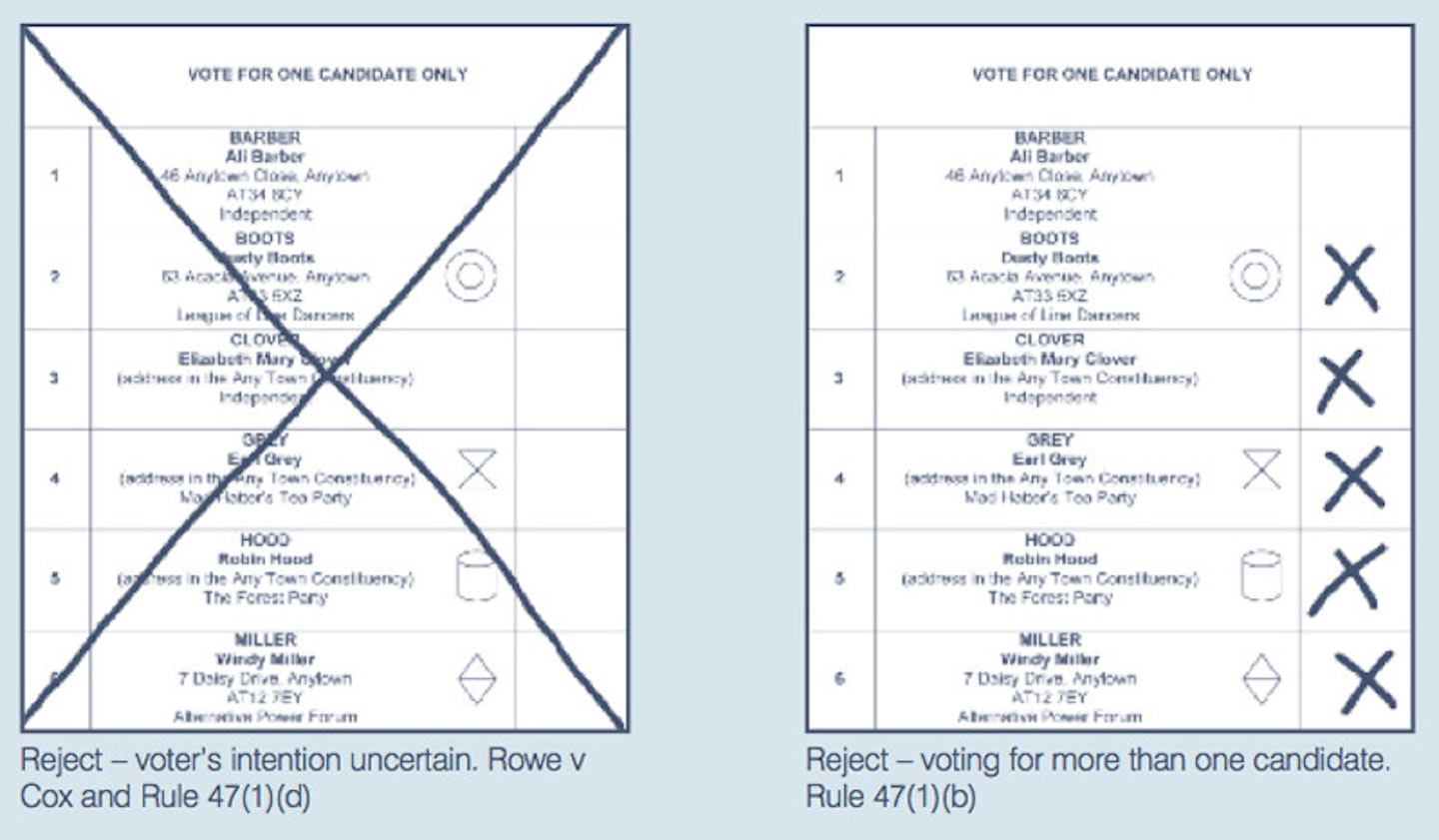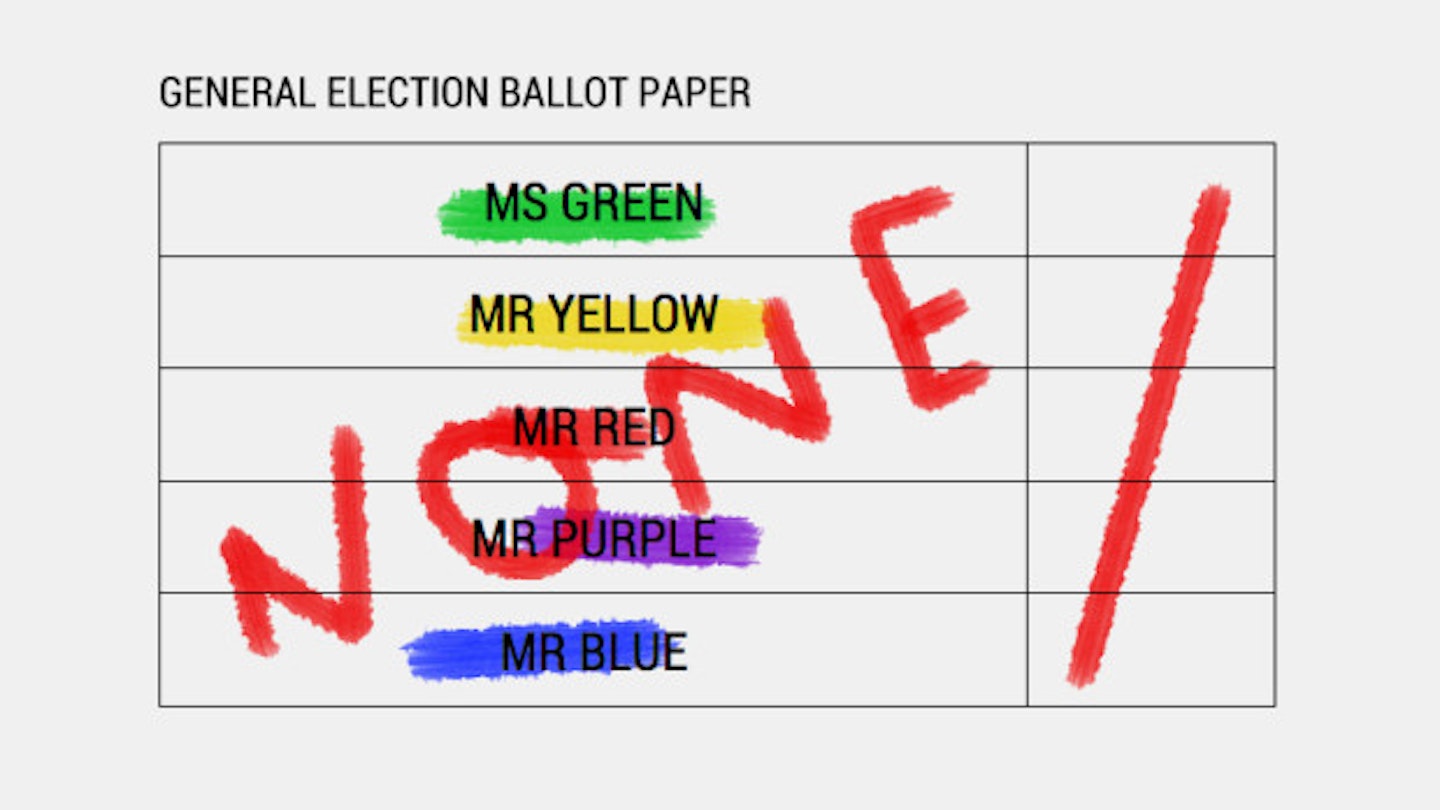So. You want to vote at the General Election on May 7th. You haven’t decided who to vote for. You go away and do some research – looking at articles online, doing one of those website questionnaires that tells you who you sympathise most with, chatting to friends, watching the news – and you come to the realisation that none of the candidates appeal to you. Basically, you don’t feel any of them represent you enough to get your vote. So what do you do then? Bin your polling card and ignore the whole process? Crack on with a boxset and pretend it’s not happening? After all, if the options are voting for something you don’t believe in, or disengaging from the whole thing, what choice do you have?
There is another option. You can spoil your ballot. Not voting at all (currently known as ‘doing a Brand’), might seem like a tempting option, but it’s a bad one, principally because if you don’t vote, you will get written off as apathetic. That’s unfair, because we’ve already established that you do care, right? You only need to spend ten minutes on Twitter while Question Time's on to see that, You just don’t want to vote for the available candidates.
On average, voters are £1850 worse off while non-voters are £2135 worse off. That seems like a pretty good reason to vote
Secondly, it means you will get ignored. It’s well established that young people vote less than old people, and that politicians tend to look after the people that elect them (or might elect them in the future). That’s why you end up with triple-locked pensions and trebled tuition fees. Also, consider this: since 2010 we’ve all been experiencing the effects of public spending cuts. A study looked into whether different groups of people were being affected equally and it turns out that, on average, voters are £1850 worse off whilst non-voters are £2135 worse off. That seems like a pretty good reason to vote.
I strongly believe that there should be a ‘None Of The Above’ (NOTA) option on the ballot paper – a formalised way of expressing dissatisfaction with the parties on offer. Several countries do it already, and anyone who has ever run or voted in a student election will probably be familiar with RON – re-open nominations, which is effectively an active vote for none of the candidates. If RON wins, as the name suggests, the election gets re-contested. NOTA is increasingly being touted as a viable option after this election - it was part of a series of recommendations made by the parliamentary Political and Constitutional Reform Committee in February.
In a perfect world, come May 7th, there will be a politician you want to vote for, in which case you’ll go out, place your vote, and then congratulate yourself for a job well done with a cup of tea and a biscuit. But what if you really, really, absolutely can’t bring yourself to do it? Then go to the polling station, tuck yourself behind the little curtain, and spoil your ballot. I was explaining the concept of ‘spoiling the ballot’ to a group of people recently and someone misheard and thought I was saying ‘soil your ballot’. Which I suppose is also an option, but probably a messier one.
What spoiling your ballot means is that you have cast your vote (for no-one) and it will be counted – as a ‘rejected vote,’ which is, annoyingly, the official terminology for a spoilt ballot. The Electoral Commission provide guidelines for the people counting the votes up, as to what must be put into the ‘rejected vote’ pile .
What spoiling your ballot means is that you have cast your vote (for no-one) and it will be counted – as a ‘rejected vote’
There are four reasons for a vote being rejected. If you write nothing at all on the ballot paper it will be rejected. If you vote for more than one candidate it will be rejected. If you write anything on the paper which could identify you – your name or address, say – it will be rejected. Votes have to be anonymous. Finally, if the ‘voter’s intention is unclear’ it will get rejected. This is the most common reason for rejection (at the 2005 election 62.1% of rejected votes were categorised as having unclear intentions). It may be that this is due to putting your cross over two boxes – then it’s fair to say that the intention is unclear. But several of the examples given by the Electoral Commission aren’t unclear in the slightest. Putting a big cross through all of the options; or writing None Of The Above and drawing a new box and putting a cross in it; the intention in both of those cases is not ambiguous. The person is voting for NO-ONE. Deliberately. Not in error and, frankly, not subtly.
So if you’re going to spoil your ballot paper, do it clearly and do it properly. My suggestion is drawing a single line through all of the boxes, and then writing NONE or NONE OF THE ABOVE in large capital letters across the names of the candidates you are rejecting. Or if you’re feeling lazy, use the pre-prepared sticker I’ve kindly provided for you with my new book None Of The Above.

The big question though is – can spoiling ballots really make a difference? I believe it can. It will certainly make more of a difference than not voting at all. 56% of young people didn’t vote at the last election. If just a fraction of them spoilt their ballots rather than staying away altogether at this General Election then suddenly that’s a news story, and it’s being reported in the press.
If nothing else, it should act as a wake-up call for the political class – there are voters out there who want to vote but aren’t being represented. If a fuss gets kicked up because the number of rejected votes is high, the Electoral Commission would hopefully be pressurised into revealing how many of those ‘rejected votes’ were due to, in their terms, ‘uncertain intention.’ At the last election in 2010 in Blackburn, nearly 4% of the electorate spoilt their ballot. That’s a lot of people – over 1700. Did they all make a mistake? I really doubt it. They were making their protest heard, and I for one will be keeping an eye out for more of that on May 7th.
Whatever happens – make sure you’ve voted.
**Liked this? You might also be in: **
Ant And Dec Have Ditched Ed Miliband - But Do Celebrity Endorsements Really Change How We Vote?
Follow Rick on Twitter @rickedwards1
Rick Edward's book None Of The Above is available to buy on Amazon
This article originally appeared on The Debrief.
